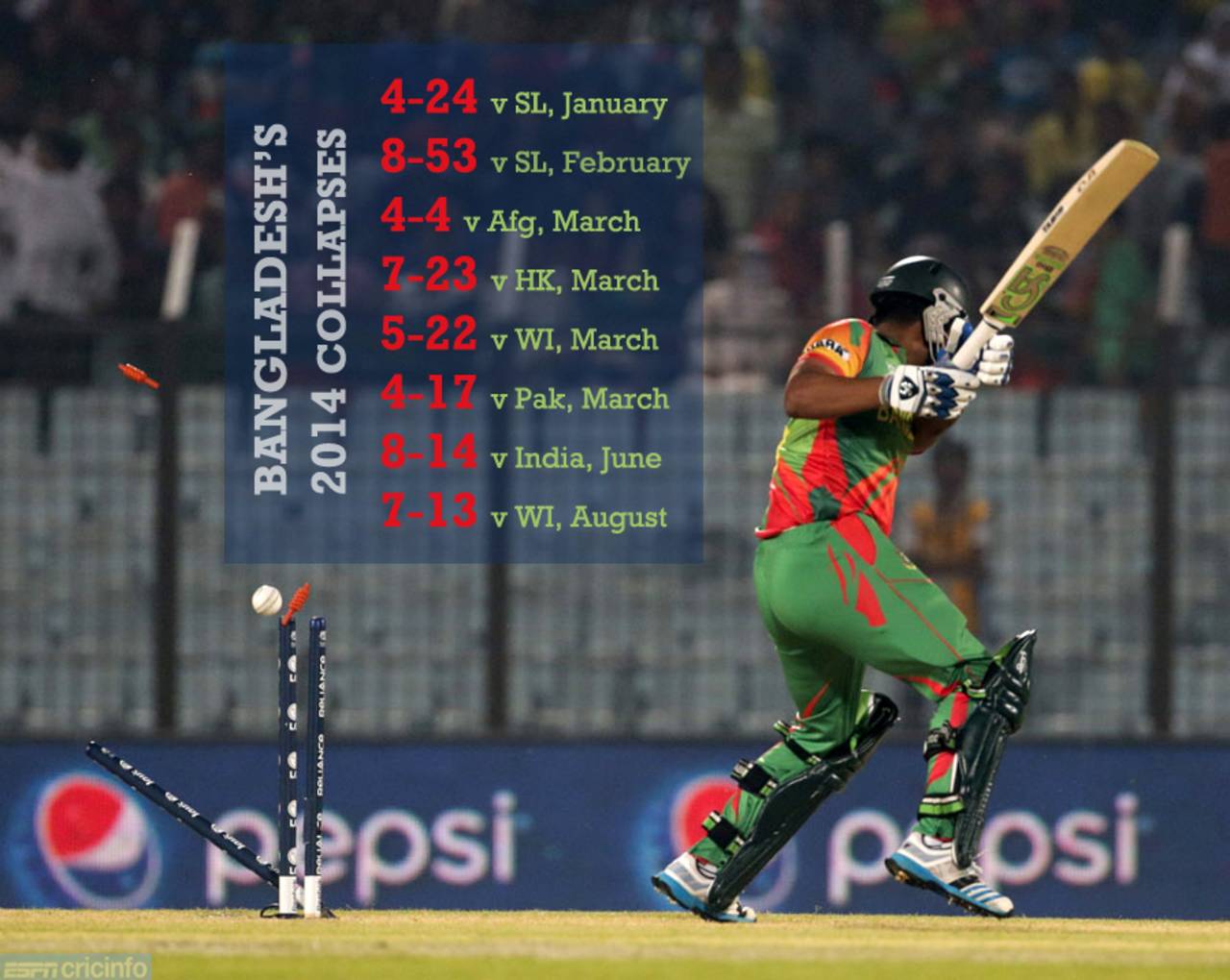"Nervous, calm, sometimes angry, depending on the situation; but most of the time the players just go quiet."
This was what
Shane Jurgensen, Bangladesh's former coach, witnessed in the dressing room during the team's frequent batting collapses. He was present during six of the eight this year, before
resigning in April.
Like any coach, Jurgensen asked tough questions later. "You would discuss it with the players individually, and [talk to] the team about what needed to happen right then.
"Just ask questions really. 'What happened', but more importantly 'what needs to happen now'. 'Are we getting through the tough periods? Are we adapting to situations? Were there good partnerships?' Then support, give them confidence and look to the future," he said.
Against West Indies in the
second ODI on Friday, Bangladesh lost seven wickets for just 13 runs and there is no guarantee of a collapse being avoided on the next occasion. The players' confidence is reaching new lows and their methods are getting stranger by the innings.
Most of them have tried to hit their way out of a jam, but it has neither worked in familiar conditions back home, nor would it work in slightly bouncier conditions. While Mushfiqur Rahim and Mahmudullah were deceived by Sunil Narine, Sohag Gazi and Nasir Hossain decided to go for glory but it went to hand.
Former Bangladesh captain
Aminul Islam thinks that since many of these players have never been exposed to these scenarios during their formative years, they have a hard time deciding what to do.
"I don't think any of the players have experienced such a situation before, playing international cricket," Islam said. "There's no pressure in domestic cricket, which means that they have a tough time understanding and overcoming a situation where they lose quick wickets and have to recover.
"At the same time, there is lack of application. A batsman has to know what to do in a certain situation. Chris Gayle hit sixes but he was circumspect for most of his innings because the ball wasn't coming on to the bat properly. They are professional cricketers at the elite level. There has to be a certain amount of self-assessment. Coaches can't quite keep teaching you these things. It has to come automatically."
Chief selector Faruque Ahmed felt that the collapse this time was a result of the
previous match where they had West Indies on 34 for 5 but ended up losing by three wickets.
"I think the players become morally down after losing a close game," Faruque said. "That's what probably happened in these two games. I think we should have won the first game. It is now getting necessary that we win a match. It has been around eight months that we have drawn a Test and beaten only Afghanistan and Nepal in T20s."
Jurgensen believes that there is a way out, but it is all going to be in the players' minds. He had seen the team perform decently in 2013, and wants the players to remember those highlights, and just do the small things properly.
"As much as winning is a habit, unfortunately at the moment so is losing," Jurgensen said. "However, this can also change very quickly with one big partnership, one big spell of bowling and a great catch. Remember Sri Lanka were 67 for 8 in the first ODI earlier this year, then they had a great lower-order partnership and that started their amazing run this year. Bangladesh can do exactly that.
"International cricket can change quickly. Just remember Rubel Hossain's spell against New Zealand last October, Mushy's [Mushfiqur's] 200 against Sri Lanka, Abdur Razzak's five wickets in the third ODI in Sri Lank last year."
When one of the first collapses unfolded this year, in January against Sri Lanka, some of the players felt that the sudden question mark over Bangladesh's international status at the time distracted them. After seven more collapses this year, players are running out of excuses.
Essentially, collapses are a result of poor mindset that spreads in the dressing room. As Jurgensen has observed, the players remain quiet; maybe there should be a bit more noise in the dressing room? An old adage in dressing rooms is to slow down the play; so if a batsman takes his time going to the middle, it might sometimes break the fielding side's momentum?
The body language of the Bangladesh players will be key in these desperate times. They are already going down together, so it will not hurt to identify and try something different. As long as this too is done together.
Mohammad Isam is ESPNcricinfo's Bangladesh correspondent. @isam84
